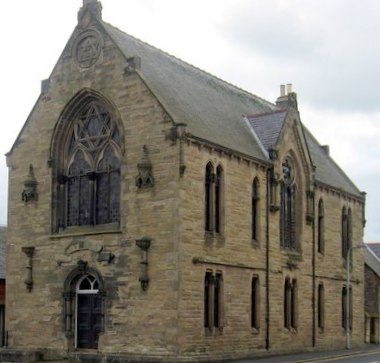
BERWICK ADVERTISER, 18 OCTOBER 1918
FUNERAL OF CAPT. NORMAN
A LARGE AND REPRESENTATIVE FOLLOWING
SERVICE IN ST. MARY’S
The funeral of the late Captain Norman took place to Berwick Cemetery on Thursday afternoon, when local gentlemen who had sat with the deceased on public bodies, or had been associated with him in Church, School, and social movements, attended in large numbers to pay their last tribute to a life spent in the public service.
At Cheviot House a large company of mourners had gathered and at two thirty the cortege moved off down Castle Terrace to the Church of St. Mary’s, where a short service was held. The blinds of all residenters on route were drawn during the passing of the cortege while here and there could be seen groups of people in the humble walks of life anxious to pay the last respect they could to one who had been a true friend in life.
Heading the procession was a detachment of the Borough Police Force, under Chief Constable Nicholson, and behind walked the sergeant at Mace (Mr Blakie) carrying the halbert draped in crepe. Following in procession walked the Magistrates and Council, and immediately behind the hearse and mourning coaches were members of the Bible Class which for so many years was conducted at Cheviot House, and then followed the boys of Berwick Grammar School, at which centre the Captain was chairman of Governors.
NEWS FROM THE LADS IN GERMANY
Mrs D. Bryson, Kiln Hill, was cheered this week to receive a post card from her son, Private Dan Bryson, H.L.I., from Gustrow Camp, Germany. He was taken prisoner in the March drive by the Germans, but he is evidently quite happy, and writes that he has some fine fellows in the camp along with him.

Private Davidson, son of Mrs Davidson, Well Square, who is prisoner at Stammlager, Germany, writes that he has been in hospital, but that he is now much better and hopes to soon be out of the hospital cot.
Private John Dawson, N.F., grandson of Mrs Ogilvie, Well Road, who is a prisoner at Stargard, Germany, has sent a letter card to his grandmother, stating that he is quite well, but would welcome a letter from her every week. The letter card he sends is rather a clever made affair and can be used again by the recipient when replying.
A PREMATURE PEACE REPORT AT BERWICK
On Sunday morning, as people were coming out of Church, a report spread like wildfire that Germany had accepted President Wilson’s terms, and peace was to be signed at mid-night. It was said that an official message was on view at the huts. We immediately set out to find if it was true. Ongoing to the huts, there was no notice to be seen, and we were told that it was on view at the Barracks, and ongoing to the Barracks, we were referred back to the huts. The fact of the matter seemed to be that some soldier had out up a notice to the effect at the huts on his own account, and later had taken it down again. We also enquired at the Police Station and at the Post Office, but nothing was known. In the evening, however, definite news came to Berwick, as it well might for the news had been known in London on the Saturday night at ten o’clock.

LOCAL NEWS
On Wednesday morning a Berwick lady was rather surprised to find herself stopped by another lady who was carrying a young baby in the full array of christening clothes. She was even more surprised when she was asked to accept a paper bag containing a piece of cake, a piece of money, and salt. This she did and for the benefit of readers who have not heard of this old custom before, we may say that it is one which is quite usual in some parts of Scotland. When the mother leaves the house to attend Church where the “baptism” is to take place it is lucky if the first person met is fair. The gift of cake, money and salt is then handed over and the future welfare of the child assured. We were permitted to examine the “gift offering” and in so doing the cake broke in two. This we are informed is symbolical of good luck and a double event next time.
Fuel and Lighting economy is responsible for several alterations in church services, St. Andrew’s Church, Berwick, and the English Presbyterian Church, Tweedmouth, are doing away with a second service on Sunday. Wallace Green and the Primitive Methodist Congregations are uniting for a week day services, and Bankhill Church, during the absence of its minister on six months sick leave, is uniting with St. Aidan’s, Church Street. A large number of the Wesleyan Methodists are worshipping with the Primitives, and several are attending Wallace Green, each individual or family deciding entirely for itself.




